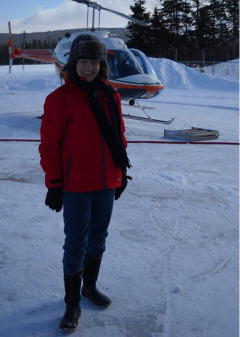Sarah Salisbury
Robledo Group, Postdoctoral Research Fellow
Current research
I am investigating the genetic underpinnings of the variation in sea lice resistance among salmonid species. Sea lice are blood-sucking parasites that can cause considerable injury to their host fish and represent one of the biggest problems facing the Atlantic salmon aquaculture industry today. Yet other salmon species appear to be more resistant to sea lice infection than Atlantic salmon.
To find out why this is I am using cutting-edge genomic technologies including single nuclei RNAseq and spatial transcriptomics to help to reveal what cell types and genes are contributing to sea lice resistance in immune salmon species. The outcomes of this research could help inform the development of sea lice-resistant aquaculture strains of Atlantic salmon using genome editing with clear benefits for the global aquaculture industry.
Favourite aquaculture species
Salmonids in general, with a soft spot for Arctic charr.
Background

I completed my undergraduate studies at the University of Guelph (Ontario, Canada) where I joined Doctor Mehrdad Hajibabaei’s lab as a research assistant and completed an honours thesis investigating the feasibility of detecting invasive Asian carp eDNA using next generation sequencing technologies.
I moved to Dalhousie University (Nova Scotia, Canada) for my MSc with Doctor Daniel Ruzzante to study the population genetic structure of Longnose Suckers (a freshwater fish) in Labrador, Canada. Tempted by the opportunity to return to Labrador, I signed up for a PhD with Daniel to study the evolutionary genomics of the salmonid species, Arctic charr, in Labrador, Canada.
It was during this work that I became captivated by salmonids. This group of fishes has a number of traits that make them incredibly useful models of evolution. For instance, many salmon species have recently evolved a variety of phenotypically distinct “morphs” that can even occur in the same lake! My PhD also brought home to me how important these species are to people. In Labrador, Arctic Charr are the basis of subsistence, recreational, and commercial fisheries that provide both economic benefits and food security to local communities.
My PhD research uncovered a variety of loci potentially contributing to morph differentiation in Arctic Charr with applications for both the conservation of wild populations and for informing aquaculture selective breeding practices. This work left me eager to further explore the functional genomic mechanisms underlying trait variation as well as to help improve the lives of both salmonids and the people that rely on them. I hope to continue to work towards these goals during my current research here at the Roslin Institute.
- [2009-2013] BSc (Honours) Marine and Freshwater Biology, University of Guelph (Ontario, Canada)
- [2013-2015] MSc Biology, Dalhousie University (Nova Scotia, Canada)
- [2016-2021] PhD Biology, Dalhousie University (Nova Scotia, Canada)
- [2022-Present] Research Fellow in Aquaculture, Roslin Institute
Interests, hopes and dreams
Outside of fish and genetics my interests include baking, science fiction novels, and ancient Greek art. I enjoy getting outside for hikes in nature when the weather is good and powerlifting when it isn’t.

